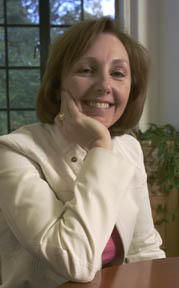Beta Mannix talks about bringing Cornell's social scientists together
By Linda Myers
"Social scientists use data to answer questions about humans and human behavior," says Elizabeth "Beta" Mannix, director of the Institute for the Social Sciences (ISS) at Cornell University -- offering a basic definition of a discipline that encompasses fields as diverse as social anthropology, economics, government and psychology.

Mannix is a longtime member of Cornell's Social Sciences Advisory Council, the group that guides ISS. "We wanted to do with the social sciences what Cornell has done with the life sciences -- to bring them together on campus," she says, explaining the vision behind ISS. "We have great resources in terms of faculty, great intellectual capital, but it's dispersed. And we knew we could do a better job at hiring and retaining top-flight social scientists."
The council developed a pool of money to help departments hire extraordinary people, says Mannix, citing Dan Lichter as an example. A professor of policy analysis and management, Lichter now heads the Bronfenbrenner Life Course Center in the College of Human Ecology (Read about Lichter's plans for the BLCC).
Mannix, who took over as ISS director from professor of sociology David Harris this semester, says of her new three-year, part-time position, "It's a great opportunity for me to get back into what's happening in the social sciences."
A social psychologist by training, Mannix is professor of management and organizations at the Johnson Graduate School of Management, where she teaches the core course Management and Leadership in Organizations and elective courses on negotiation and teams and runs the analytical thinking, teamwork and conflict management components of orientation for new MBA students. She also runs the Bristol-Myers Squibb Leadership Fellows, a program in which second-year MBAs mentor first-year students on leadership skills.
Workplace diversity is one area she researches. "Many social scientists on campus are working on things related to what I do," says Mannix, who credits her ISS involvement with introducing her to Lisa Nishii, assistant professor of human resources in the School of Industrial and Labor Relations, who researches cross-cultural workplace issues. "She found barriers to U.S. firms' implementing equal employment opportunity-type programs overseas, which interests me," Mannix says.
The ISS is modeled partly on Cornell's Society for the Humanities and advanced research centers at the Universities of California and Michigan. What's different, and unique, about the Cornell institute is its thematic approach, Mannix says. Each year a specific theme is selected, and faculty across campus are invited to submit proposals, with three years to plan, put into action and complete them. They range from co-instructed courses to collaborative projects, workshops, journal articles and books. "The main idea is to foster interdisciplinary connections among people," Mannix says.
Last year's theme, the Evolving Family, attracted projects as far-ranging as the study of bird families (Professors Elizabeth Atkins-Regan, psychology, and Stephen Emlen, neurobiology and behavior) and the study of prison populations (Professor Mary Katzenstein, government) as well as affiliated faculty in Africana studies, neurobiology and policy analysis and management, with further contributions from visiting speakers and postdoctoral talent.
This year's theme, Getting Connected: Social Science in the Age of Networks, so far has attracted faculty in communication, computer science, economics, human resources, management and sociology.
"We're meeting twice a month to determine what form [the work] will take," Mannix says. "I'm so excited about the huge potential" for the projects and for the ISS, she says. "It's going to be really great."
Media Contact
Get Cornell news delivered right to your inbox.
Subscribe